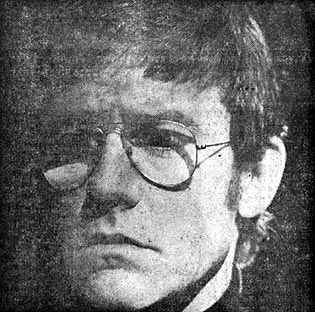 |
|  |
 |
|
 |
 |
 |  |  |  |  |  |  |
HOLLYWOOD — Roddy McDowall spent his youth as costar to a dog (Lassie) and a horse (in “My Friend Flicka”) and now, he’s managed to keep his acting career in full stardom by playing an ape.
Although he’s never lacked work, it is ironic that after more than 30 years in the acting profession, he has generated his greatest success playing an ape. The characterisation has now led him into the starring role as head ape in “Planet of the Apes,” a new television series (CBS, Friday nights, 8-9) based on the enormously successful “Apes” pictures. Roddy appeared in four of the five.
“I think Lassie and Flicka would be proud of me,” McDowall joked.
He’s 45 years old yet still retains that youthful look that kept him in juvenile roles until his mid-thirties. He played a 17-year-old high school senior (in “Lord Luv A Duck”) when he was 32-years-old.
In more recent years — before the apes took hold — McDowall diversified and went into stage work to shed his jevenile image. The switch proved a wise move because it gave him a chance to flex his acting muscles. He won a Tony Award for his Broadway performance in “The Fighting Cock” and an Emmy for “American Heritage.” He jokes about the Emmy because of an incident during the live telecast.
“I won an Emmy for losing my hair,” he recalled. “I wore a wig in the show and Arthur Kennedy had to grab me by the head.
“As he did,” McDowall continued, “I could feel the wig losening. I had to clamp my hands over Kennedy’s hands (McDowall demonstrated) and didn’t let go until it was time for him to remove his hands.”
It seems that having gone through the ordeal of 3½ hours of daily makeup every time he made an “Apes” picture, the thought of facing it again would turn him off. McDowall doesn’t seem fazed by it.
There’s an irony there, too. McDowall thinks his greatest performances have come in the “Apes” pictures — yet he’s virtually anonymous behind the makeup.
“You lose all identity making these films.” he said. “I never met Claude Akins until after the last film. Then, I went to a party and recognised his eyes.”
|
 |  | Roddy McDowall's own face has been seen on Broadway, TV, and the movie screen.
|
|  |  |
 |
The history of the “Apes” films is amazing. The first film, “Planet of the Apes,” was such a box-office hit it astounded 20th Century Fox. Charlton Heston had the only human role — all others, McDowall and Kim Hunter among them, were apes.
A sequel did almost as well, and three more followed. In two of the films, McDowall played Cornelius the archaeologist, but was killed off. He couldn’t make the third film becuase of a prior commitment, but returned for the last two, playing a baby chimp who grew up and took over the world — the ape culture. He considers the role — especially that in the fourth film — the “best I ever played in my life.”
Twice last year, CBS televised “Apes” pictures. The ratings were fantastic. The opposition virtually was wiped out. It became apparent, then, that the network had to put it into a series.
McDowall’s TV role will be an extension of the one he liked so much in the films — the head ape. He’ll be named Galen, and is described as the young dilettante son of an intellectual ape, who becomes a renegade to his own people.
Galen is considered a maverick because he believes there was a man culture before the ape culture.
Herbert Hirschman, the series producer, says he hopes the show will make some social statements, but so do all other producers of new series. Hirschman acknowledges, however, that the TV version will be mostly action-drama. Unlike the films, humans will speak in the TV series. In the films, they were treated as mute barbarians. In TV, the humans will be in a state of peonage, according to Hirschman — used as farmers and other low-status labourers.
The idea of public fascination for apes may puzzle some people, but not McDowall. “It’s sort of simple,” he explains, “turning everything upside-down, that appeals to viewers.”
It will be an expensive production, estimated to run about $225,000 an episode. That’s $40,000 more than what it costs to produce the average hour’s show for television these days. |
|
|
 |  |  |
| BELOW: The feature as it originally appeared. |  |
|
|
|
|
|
|
|
|
 | |
|
|
|  |
|